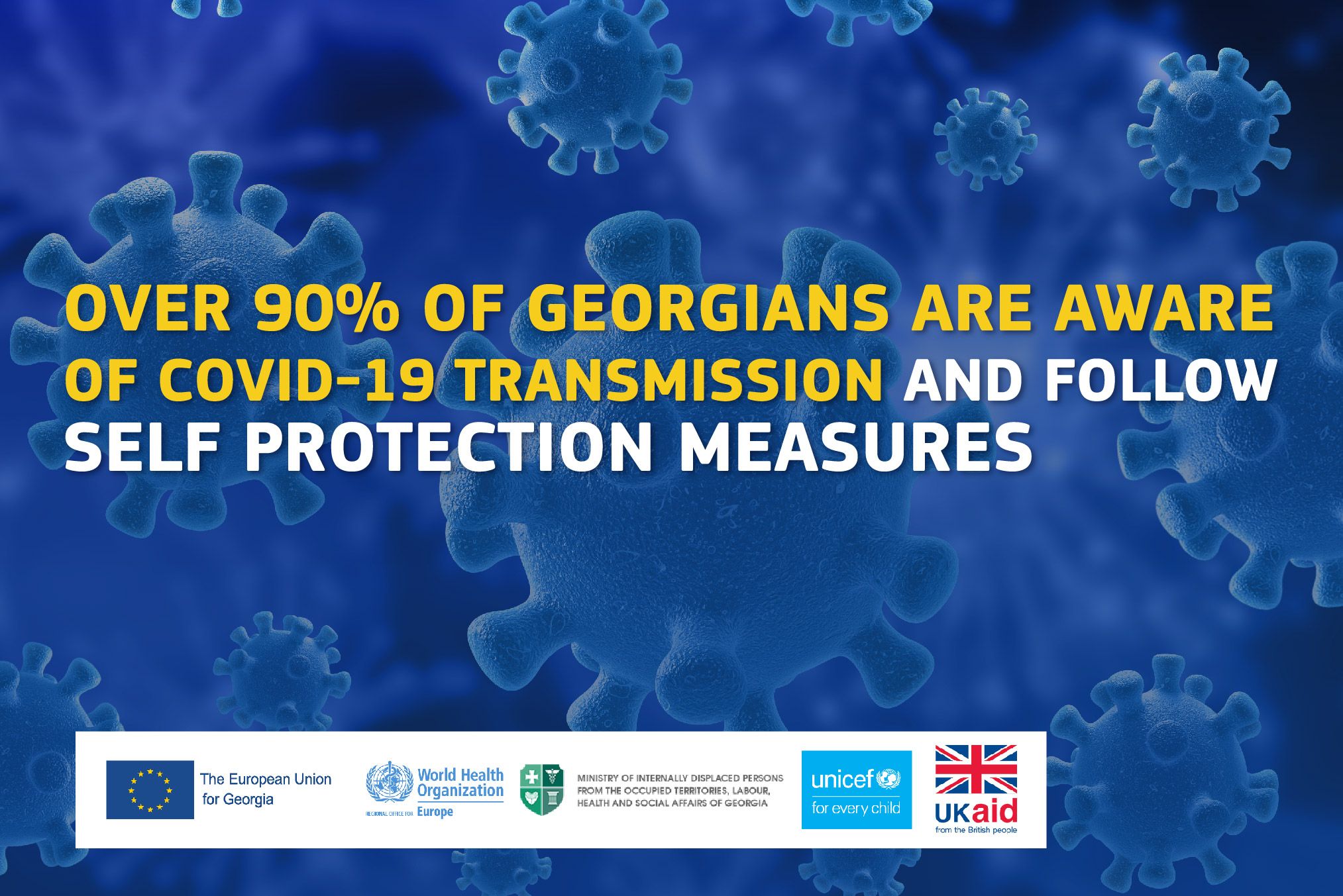
Study reveals awareness of the population on COVID-19 and positive attitudes towards actions taken to combat the pandemic
The results of a recent Behaviour Insights Study, conducted to determine public attitudes and behaviours of Georgian population during the time of COVID-19, was presented today through a web-briefing to interested parties engaged in combatting the pandemic in Georgia. The study was conducted by WHO Regional Office for Europe and UNICEF in agreement with the Ministry of Internally Displaced Persons from the Occupied Territories, Labour, Health and Social Affairs of Georgia, with support from WHO Regional Office for Europe, the European Union and the UK Government.
Three waves of the study, conducted with 1-week intervals during 21 April- 15 May and covering all regions of Georgia (except Abkhazia and South Ossetia), revealed the following results:
- Majority of respondents (76-84%) believe that the Government of Georgia has taken adequate measures to prevent the spread of COVID-19 and to ensure timely response; trust towards responsible state agencies has also proved high.
- Over 90% of the population is well aware on COVID-19 symptoms and its transmission, while adherence to self-protection measures is also above 90%.
- However, there are certain gaps in awareness on less common symptoms related to Covid-19 – respondents are therefore eager to receive additional information.
- On how the population is coping with Coronavirus, the study reveals moderately optimistic perceptions, with 55% assessing that the probability to be infected by COVID-19 is low.
“The EU has stood by Georgia from the very beginning of the COVID-19 crisis in many ways, through supporting this Behaviour Insights study, which is only a tiny part of the EU overall support amounting to approximately 1.5 billion GEL, but also through a substantial delivery of medical equipment expected to reach Georgia next week,“ – says Catalin Gherman, Deputy Head of Cooperation at the EU Delegation to Georgia. “The study is important not only to understand where the population stands in relation to the crisis but also to guide us all in our future interventions responding to COVID-19. Such reality check connecting us with the expectations and perceptions of the population allows the design of the most spot-on responses. With this in mind, the EU will continue to stand by Georgia in fighting the pandemic the best way possible”
Together with determining public attitudes, the results of the study, being shared with relevant state structures and donors, is of great help in assisting them for planning further activities to combat COVID-19 outbreak, apart from being actively used by the Risk Communication and Community Engagement Strategy and Action Plan.
“WHO has been collaborating with Georgia for many years, and our collaboration intensified during this pandemic,” – says Silviu Domente, WHO Representative in Georgia. “This study gives us most valuable information that is already used to shape up on-going and future interventions in response to COVID-19 crisis. Results are already reflected in the Risk Communication and Community Engagement Strategy, which the Government of Georgia is developing in partnership with WHO and UNICEF to strengthen the country’s preparedness and response capacities for the possible second wave, and the communication materials under production are adapted, so that they better respond to population’s needs and expectations.”
“Since the outbreak of the pandemic, UNICEF has provided significant support to Georgia to meet immediate emergency needs and strengthen the country’s capacity to respond to this public health emergency,” – says Dr. Ghassan Khalil, UNICEF Representative in Georgia. “In partnership with WHO and our donors, UNICEF has supported the NCDC and the Ministry of Health in developing the Risk Communication and Community Engagement Strategy which will soon be approved by the Ministry of Health. The results of the Behaviour Insights study have been crucial in this process and will further be used to shape up further assistance and interventions”.
In addition to the above three country-wide rounds, the study focused on Kvemo Kartli and Samtskhe Javakheti regions (due to their ethnic minorities). The results of the regional study will be available for the public soon.
For further information, contact:
Tamriko Mikadze, Press and Information Officer, Delegation of the European Union to Georgia; Tamriko.Mikadze@eeas.europa.eu
Kakha Gvinianidze, National Professional Officer, WHO CO Georgia; gvinianidzek@who.int
Maya Kurtsikidze, Communication Officer, UNICEF Georgia; mkurtsikidze@unicef.org